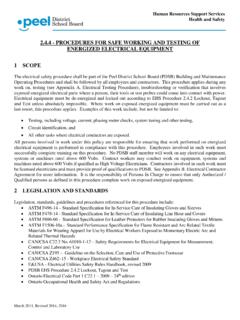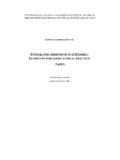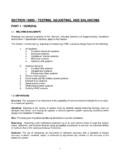Transcription of NATO'
1 JOINT ANALYSIS AND LESSONS LEARNED CENTRE NATO' S LEAD AGENT FOR JOINT ANALYSIS A proud member of Allied Command Transformation The nato Lessons Learned Handbook Third Edition, February 2016 Acknowledgements The nato Joint Analysis and Lessons Learned Centre would like to thank the US Navy Reservists who supported us in producing this handbook. nato , Joint Analysis and Lessons Learned Centre, 2016. Distributed free of charge for informational purposes; copies can be obtained on request, subject to availability from JALLC. The sale and reproduction of this handbook for commercial purposes is prohibited. Extracts may be used for bona fide educational and informational purposes subject to attribution to JALLC.
2 ISBN: 978-92-845-0188-5 For it is a habit of mankind to entrust to careless hope what they long for, and to use sovereign reason to thrust aside what they do not desire. Thucydides, 404 BC, the Peloponnesian War Human beings, who are almost unique in having the ability to learn from the experience of others, are also remarkable for their apparent disinclination to do so. Douglas Adams, author of The Hitchhiker s Guide to the Galaxy FOREWORD nato s Joint Doctrine for Operations states that, The purpose of a Lessons Learned procedure is to learn efficiently from experience and to provide validated justifications for amending the existing way of doing (AJP-3(B) Allied Joint Doctrine for the Conduct of Operations).
3 To ensure the Alliance remains a successful learning organization, a robust and effective Lessons Learned Capability must be in place. Such a capability must include the right structure, the right process, and the right tools in order to capture, analyse, and take remedial action on any issue, as well as to to communicate and share results to achieve improvement. We, the Lessons Learned community, must take responsibility for our respective parts of the Lessons Learned Capability whether related to the structure, the process, or the tools. Perhaps equally important, we should also strive to foster the right mindset; among the Lessons Learned community, but also among those at the leadership level who have the responsibility for ensuring that Lessons Identified become Lessons Learned.
4 I believe that this nato Lessons Learned Handbook is therefore an important read for all of us. It helps us to understand how we can capture, analyse, and share Lessons Learned information to drive the transformation of the Alliance. It remains a useful source of Lessons Learned related information within nato , but its scope extends beyond the Organization as well. It is with pleasure that I present this third edition of the nato Lessons Learned Handbook to help those who conduct Lessons Learned activities acquire the knowledge they need to facilitate their organization s Lessons Learned capability. This edition has been reviewed to ensure the information captured herein remains in line with current guidance on nato s Lessons Learned process and includes certain minor changes to incorporate the latest expertise and experience from the Lessons Learned community.
5 Mircea M NDRESCU Brigadier General, Romanian Army Commander JALLC CONTENTS Foreword .. 9 1 Introduction .. 1 What is Lessons Learned? .. 1 Who Needs to Learn Lessons? Everyone! .. 3 What is the Role of a LL Staff Officer? .. 4 How To Get Started In Lessons Learned! .. 6 Summary .. 8 2 nato LL Capability, Process, and Actors .. 9 nato Lessons Learned 9 nato Lessons Learned Process .. 11 nato Actors in the Lesson Learned Process .. 13 Summary .. 17 3 Gathering Observations .. 18 Capturing Observations .. 18 Managing Observations .. 20 Tools to Capture and Manage Observations .. 22 Summary .. 24 4 Analysis Observation to Lesson Identified .. 26 Prepare for Analysis .. 26 Visualization .. 29 Analysis Techniques .. 29 Write Up Lessons Identified.
6 32 Summary .. 32 5 Staffing Lessons Identified to Lessons Learned .. 33 Project Management Considerations .. 33 Endorsement and Tasking .. 35 Implementation and Monitoring .. 35 Validation .. 35 Tools to Support Staffing Lessons from Identified to Learned .. 36 Summary .. 37 6 Lesson Learned Information Sharing .. 38 Whom To Share LL Information With? .. 39 When To Share? .. 40 How to Share LL Information? .. 41 Summary .. 44 7 Final Thoughts .. 45 Useful Lessons Learned Points of Contact .. 45 Further Lessons Learned Information .. 45 References .. 46 Annex A LL Glossary .. A-1 Abbreviations .. A-3 Annex B Lesson Template .. B-1 Using the Lesson Template .. B-2 Annex C Some LI Examples .. C-1 Joint Example .. C-1 Maritime Example .. C-2 Land Example.
7 C-3 Air Example .. C-4 Annex D Interview Process .. D-1 Annex E LL Capability E-1 Mindset .. E-1 Leadership .. E-1 E-1 Process .. E-1 Tools .. E-2 1 Notes 1 INTRODUCTION Welcome to the nato Lessons Learned Handbook. The purpose of this handbook is to guide and assist you in fulfilling your role in supporting your organization and nato to effectively learn from experience. This handbook uses nato s approach to Lessons Learned as the underlying model but has been written to be relevant to any organization. This opening chapter sets the stage for the rest of this handbook by giving an overview of: What is Lessons Learned? Who Needs to Learn Lessons? What is The Role of a Lessons Learned Staff Officer (LLSO)? How to Get Started in Lessons Learned!
8 WHAT IS LESSONS LEARNED? The term Lessons Learned is broadly used to describe people, things and activities related to the act of learning from experience to achieve improvements. The idea of Lessons Learned in an organization is that through a formal approach to learning, individuals and the organization can reduce the risk of repeating mistakes and increase the chance that successes are repeated. In the military context, this means reduced operational risk, increased cost efficiency, and improved operational effectiveness. Lessons Learned describes more than just learning from experience. Learning must be used to justify changes that will lead to improved performance. This is made clear in nato s Joint Doctrine for Operations, which states: The purpose of a Lessons Learned procedure is to learn efficiently from experience and to provide validated justifications for amending the existing way of doing things, in order to improve performance, both during the course of an operation and for subsequent operations.
9 This requires lessons to be meaningful and for them to be brought to the attention of the appropriate authority able and responsible for dealing with them. It also requires the chain of command to have a clear understanding of how to prioritise lessons and how to staff them. AJP-3(B) Allied Joint Doctrine for the Conduct of Operations1 Depending on your nation, HQ or organization, you will encounter the term Lesson Learned (and the acronym LL) applied both to the end result of a formal learning process or to one of the intermediate results, a lesson to be learned or a Lesson Identified (LI). 1 Allied Joint Doctrine for the Conduct of Operations, AJP-3(B), March 2011, Paragraph 0454.
10 2 Notes Lessons can be derived from any activity. They are a product of operations, exercises, training, experiments, and day-to-day staff work. During the course of our activities most of us will recognize ways of doing things more easily or efficiently that can be passed on to our colleagues and successors to help them avoid problems and do even better than we did before. The challenge facing any organization is to build a culture within which we all feel comfortable and motivated to share our knowledge in a productive way. In the course of learning lessons, we exploit both explicit and tacit knowledge. In any learning organization, regardless of whether you are learning from explicit or tacit knowledge, you will follow the same three basic stages of learning.









